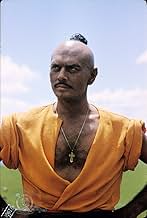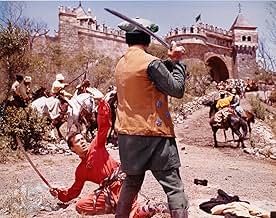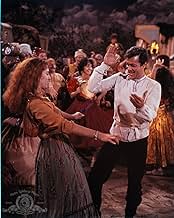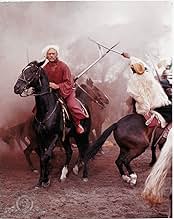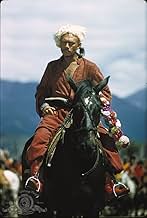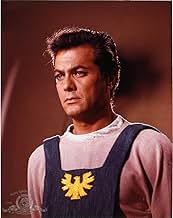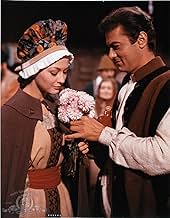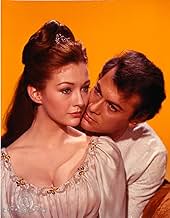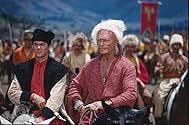VALUTAZIONE IMDb
6,3/10
4802
LA TUA VALUTAZIONE
Nell'Ucraina del XVI secolo, i grandi feudatari polacchi e i cosacchi ucraini combattono per il controllo della terra, ma le frequenti invasioni turche li costringono a unirsi contro il nemi... Leggi tuttoNell'Ucraina del XVI secolo, i grandi feudatari polacchi e i cosacchi ucraini combattono per il controllo della terra, ma le frequenti invasioni turche li costringono a unirsi contro il nemico comune.Nell'Ucraina del XVI secolo, i grandi feudatari polacchi e i cosacchi ucraini combattono per il controllo della terra, ma le frequenti invasioni turche li costringono a unirsi contro il nemico comune.
- Regia
- Sceneggiatura
- Star
- Candidato a 1 Oscar
- 3 candidature totali
Leon Alton
- Servant
- (non citato nei titoli originali)
Recensioni in evidenza
That this classic novel by Gogol about the legendary Ukrainian cossack hero could have been made into a big-budget Hollywood blockbuster, and that this was done at the very height of the cold war seems unbelievable today.
While the film is dated a bit by the kitschy love story involving Tony Curtis' character, Yul Brynner is perfect in his role which seems one of those he was born to play.
A colourful and spectacular historical epic in the best of the then-dying old Hollywood tradition, this is probably the only exposure that the American public at large has to Ukrainian history, and in this alone it is a valuable work. But the film manages to succeed on the entertainment level as well, and I recommend it to all fans of the good ol' Hollywood studio historical drama.
While the film is dated a bit by the kitschy love story involving Tony Curtis' character, Yul Brynner is perfect in his role which seems one of those he was born to play.
A colourful and spectacular historical epic in the best of the then-dying old Hollywood tradition, this is probably the only exposure that the American public at large has to Ukrainian history, and in this alone it is a valuable work. But the film manages to succeed on the entertainment level as well, and I recommend it to all fans of the good ol' Hollywood studio historical drama.
Borrowing from Gogol the title ,the proper nouns and the son's killing,Jack Lee Thompson's movie is quite entertaining,ideal for a rainy day or after a hard day's work.
The first part is the most interesting: the scenes at the university with its sadistic monks -while one of them is flogging the rebel students,the other kneels down and pray- and its "racism" : a lot of Pole Students cannot accept the fact that those primitive savage cossacks study in their school.Curtis was almost emasculated "to prevent him from sullying Pole girls." It sometimes recalls"Romeo and Juliette",which Christine Kaufman's resemblance with Olivia Hussey who would play the part of Juliette six years later reinforces.Yul Brynner is ideally cast as Taras.
The 1936 French version ("Tarass Boulba" French spelling)mainly deals with the second part -the siege- and the stories are similar with the same love interest.
The first part is the most interesting: the scenes at the university with its sadistic monks -while one of them is flogging the rebel students,the other kneels down and pray- and its "racism" : a lot of Pole Students cannot accept the fact that those primitive savage cossacks study in their school.Curtis was almost emasculated "to prevent him from sullying Pole girls." It sometimes recalls"Romeo and Juliette",which Christine Kaufman's resemblance with Olivia Hussey who would play the part of Juliette six years later reinforces.Yul Brynner is ideally cast as Taras.
The 1936 French version ("Tarass Boulba" French spelling)mainly deals with the second part -the siege- and the stories are similar with the same love interest.
Although the famous Nikolai Gogol novel, Taras Bulba, was filmed many times, this version starring Tony Curtis and Yul Brynner is the best known at least in the USA. It's an exciting portrait of 16th century Ukraine under the then powerful kingdom of Poland.
What's strangely muted in this version though is the religious angle. The Poles are Roman Catholic and the Ukranians are Russian Orthodox, it's a very big part of the reason for the resentments shown here yet we never see the religious beliefs portrayed for either group. Not sure why the script didn't include it.
As rulers the Poles hire out the Cossack Ukranians who in today's terminology might be considered a paramilitary outfit to fight off the Ottoman Turks and then turn on them. Yul Brynner as one of the Cossack brigade commanders lops off the right hand of Guy Rolfe, the Polish prince in retribution, but that hardly satisfies. He goes back to the steppes of the Ukraine and awaits a time for some real payback.
In the meantime he fathers two sons, Tony Curtis and Perry Lopez, who both inherit their father's geopolitical views. Brynner sends them off to school in Poland to learn all the Poles know.
While there Curtis falls in love with a Polish princess Christine Kauffman. It's the beginning of his downfall as a Cossack.
In his memoirs Tony Curtis says that Yul Brynner was a strangely aloof character with a sort of self imposed grandeur about him in his manner. But that Taras Bulba was a part he was born to play. I certainly can't visualize anyone else in the role, including Burt Lancaster who originally had the screen rights then gave them to Tony Curtis when he couldn't do the film. Of course Brynner being in the title role might have had some resentments to being second billed to Curtis, but Curtis in fact as a co-producer and he who produces decides billing.
Curtis also mentions that on the Argentine pampas location away from American laws, the long banned 'flying W' was used in the filming of the battle and charge scenes and many horses were killed. He also mentions that with production overrun costs and accountants ripping him and the film company off what started as a three million dollar film became a nine million dollar film and Taras Bulba in theatrical release barely cleared ten million.
However Tony did get a second wife out of the film. Christine Kauffman became the second Mrs. Tony Curtis after the film. Curtis says that Christine did not break him and Janet Leigh up, that things were over before he met here, still that was the common gossip back in the day.
Director J. Lee Thompson made great use of the Argentine pampas standing in for the Ukraine steppes and one does get a feel for the Cossack love of the land the freedom of the wide open spaces. Cossack stories in the Ukraine are just like our American westerns. Those people for all their faults settled and conquered much of what is now Russian Federation.
As a bonus Franz Waxman's musical score which did earn Taras Bulba it's only Academy Award nomination is really quite rousing. We get to hear Yul Brynner sing in this film which is a treat, a Cossack drinking song. And the love theme for Curtis and Kauffman, The Wishing Star, is a very beautiful song that Tony Martin put on an album of film songs he did at the time.
Ukranian Americans loved this particular film for which I can personally attest. I think others will as well.
What's strangely muted in this version though is the religious angle. The Poles are Roman Catholic and the Ukranians are Russian Orthodox, it's a very big part of the reason for the resentments shown here yet we never see the religious beliefs portrayed for either group. Not sure why the script didn't include it.
As rulers the Poles hire out the Cossack Ukranians who in today's terminology might be considered a paramilitary outfit to fight off the Ottoman Turks and then turn on them. Yul Brynner as one of the Cossack brigade commanders lops off the right hand of Guy Rolfe, the Polish prince in retribution, but that hardly satisfies. He goes back to the steppes of the Ukraine and awaits a time for some real payback.
In the meantime he fathers two sons, Tony Curtis and Perry Lopez, who both inherit their father's geopolitical views. Brynner sends them off to school in Poland to learn all the Poles know.
While there Curtis falls in love with a Polish princess Christine Kauffman. It's the beginning of his downfall as a Cossack.
In his memoirs Tony Curtis says that Yul Brynner was a strangely aloof character with a sort of self imposed grandeur about him in his manner. But that Taras Bulba was a part he was born to play. I certainly can't visualize anyone else in the role, including Burt Lancaster who originally had the screen rights then gave them to Tony Curtis when he couldn't do the film. Of course Brynner being in the title role might have had some resentments to being second billed to Curtis, but Curtis in fact as a co-producer and he who produces decides billing.
Curtis also mentions that on the Argentine pampas location away from American laws, the long banned 'flying W' was used in the filming of the battle and charge scenes and many horses were killed. He also mentions that with production overrun costs and accountants ripping him and the film company off what started as a three million dollar film became a nine million dollar film and Taras Bulba in theatrical release barely cleared ten million.
However Tony did get a second wife out of the film. Christine Kauffman became the second Mrs. Tony Curtis after the film. Curtis says that Christine did not break him and Janet Leigh up, that things were over before he met here, still that was the common gossip back in the day.
Director J. Lee Thompson made great use of the Argentine pampas standing in for the Ukraine steppes and one does get a feel for the Cossack love of the land the freedom of the wide open spaces. Cossack stories in the Ukraine are just like our American westerns. Those people for all their faults settled and conquered much of what is now Russian Federation.
As a bonus Franz Waxman's musical score which did earn Taras Bulba it's only Academy Award nomination is really quite rousing. We get to hear Yul Brynner sing in this film which is a treat, a Cossack drinking song. And the love theme for Curtis and Kauffman, The Wishing Star, is a very beautiful song that Tony Martin put on an album of film songs he did at the time.
Ukranian Americans loved this particular film for which I can personally attest. I think others will as well.
I agree with most of the posts. However, one area that does not get attention is the soundtrack to the movie. When the Cossacks gather and ride to the Polish city to fight, the music is truly great. Having seen the movie over 40 years ago I can still hear the music of the ride to Dubnoi over and over in my head. I find it intoxicating!! Yul Brenner is made for the part of Tarus. I could never see Tony Curtis as a Ukrainian prince and his looks do not fit the part. He is however a Hungarian of Eastern European descent. This is a fun movie that has a great score, cinematography, and some interesting scenes and performances. The Yul Brenner song is laughable though.
I have not seen Taras Bulba for many years and just came online to try and buy a copy. No mention of it at all on Amazon, as if it had never existed. No-one could ever forget the contest as the horses jump the gradually widening ravine, and the defeat in victory for the young Andrei (Tony Curtis) as the old warrior dies. When my wife married me nearly 20 years ago she reminded me of the times I had quoted the polish commander, excuse me if it is not quite accurate but it went something like this. "If we could harness the power of love we could rule the world" So many have tried other ways but still only the power of love will overcome all in the end.
Lo sapevi?
- QuizAccording to director J. Lee Thompson, in an interview in Yul Brynner: The Man Who Was King (1995), there was a misunderstanding with the hundreds of Argentine gauchos playing horsemen . They were told that horsemen who fell off their horse during an attack scene would be paid extra--but only those who were directed to do so. When the scene was shot, two-thirds of them fell off their horses and expected the extra pay. Upon being told they were not going to be paid extra, they threatened to strike. Yul Brynner then took steak dinners out to their encampment that evening and spent hours entertaining them. Impressed by this, the gauchos returned to work the next day.
- BlooperThe Cossack's "scalp-lock" is not on the back but the front! Only the old Cossack is the one that has it correctly.
- Curiosità sui creditiThanks to the army of the Argentine Republic.
- ConnessioniEdited into Kronos: Attack of the Barbarians (1967)
I più visti
Accedi per valutare e creare un elenco di titoli salvati per ottenere consigli personalizzati
- How long is Taras Bulba?Powered by Alexa
Dettagli
Botteghino
- Budget
- 7.000.000 USD (previsto)
- Lordo in tutto il mondo
- 22.533 USD
- Tempo di esecuzione2 ore 2 minuti
- Proporzioni
- 2.39 : 1
Contribuisci a questa pagina
Suggerisci una modifica o aggiungi i contenuti mancanti

Divario superiore
By what name was Taras il magnifico (1962) officially released in India in English?
Rispondi

